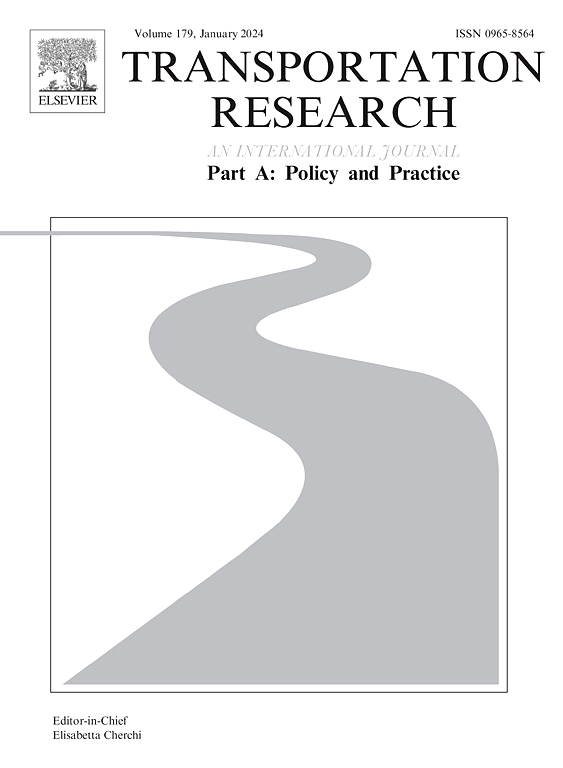Empowering econometric methods with machine learning for policy making: A comparative study in maritime transportation
IF 6.8
1区 工程技术
Q1 ECONOMICS
Transportation Research Part A-Policy and Practice
Pub Date : 2025-08-19
DOI:10.1016/j.tra.2025.104635
引用次数: 0
Abstract
The maritime transportation plays a critical role in global trade, yet ensuring its safety and regulatory compliance remains a significant challenge. This study investigates the comparative strengths and limitations of econometric methods and machine learning in supporting policymaking. Leveraging publicly accessible data from port state control (PSC) inspections as the case study, we develop models to identify key factors influencing ship deficiencies (i.e., non-compliance) in PSC and to predict the number of deficiencies during inspections. The results show that machine learning outperforms econometric methods in predictive performance, while econometric methods offer unique advantages in providing interpretable causal insights, enabling a deep understanding of the factors influencing ship deficiencies. Furthermore, by integrating machine learning techniques into econometric frameworks, we uncover nuanced relationships — such as the heterogeneous impact of ship age on ship deficiencies and a U-shaped relationship between ship tonnage and deficiencies — while also enhancing the predictive reliability of econometric methods. By combining the interpretability of econometric methods with the predictive power of machine learning, this study establishes a robust framework for assessing ship risk, enhancing maritime safety management, mitigating maritime risks, and improving transportation policies and regulations.
用机器学习增强计量经济学方法的决策能力:海上运输的比较研究
海上运输在全球贸易中发挥着至关重要的作用,但确保其安全和合规仍然是一项重大挑战。本研究探讨了计量经济学方法和机器学习在支持政策制定方面的比较优势和局限性。利用港口国监督(PSC)检查中可公开获取的数据作为案例研究,我们开发了模型,以确定PSC中影响船舶缺陷(即不合规)的关键因素,并预测检查期间缺陷的数量。结果表明,机器学习在预测性能方面优于计量经济学方法,而计量经济学方法在提供可解释的因果见解方面具有独特的优势,能够深入了解影响船舶缺陷的因素。此外,通过将机器学习技术集成到计量经济学框架中,我们发现了细微的关系——例如船龄对船舶缺陷的异质影响以及船舶吨位与缺陷之间的u型关系——同时也增强了计量经济学方法的预测可靠性。通过将计量经济学方法的可解释性与机器学习的预测能力相结合,本研究建立了一个强大的框架,用于评估船舶风险,加强海上安全管理,减轻海上风险,改善运输政策和法规。
本文章由计算机程序翻译,如有差异,请以英文原文为准。
求助全文
约1分钟内获得全文
求助全文
来源期刊
CiteScore
13.20
自引率
7.80%
发文量
257
审稿时长
9.8 months
期刊介绍:
Transportation Research: Part A contains papers of general interest in all passenger and freight transportation modes: policy analysis, formulation and evaluation; planning; interaction with the political, socioeconomic and physical environment; design, management and evaluation of transportation systems. Topics are approached from any discipline or perspective: economics, engineering, sociology, psychology, etc. Case studies, survey and expository papers are included, as are articles which contribute to unification of the field, or to an understanding of the comparative aspects of different systems. Papers which assess the scope for technological innovation within a social or political framework are also published. The journal is international, and places equal emphasis on the problems of industrialized and non-industrialized regions.
Part A''s aims and scope are complementary to Transportation Research Part B: Methodological, Part C: Emerging Technologies and Part D: Transport and Environment. Part E: Logistics and Transportation Review. Part F: Traffic Psychology and Behaviour. The complete set forms the most cohesive and comprehensive reference of current research in transportation science.

 求助内容:
求助内容: 应助结果提醒方式:
应助结果提醒方式:


